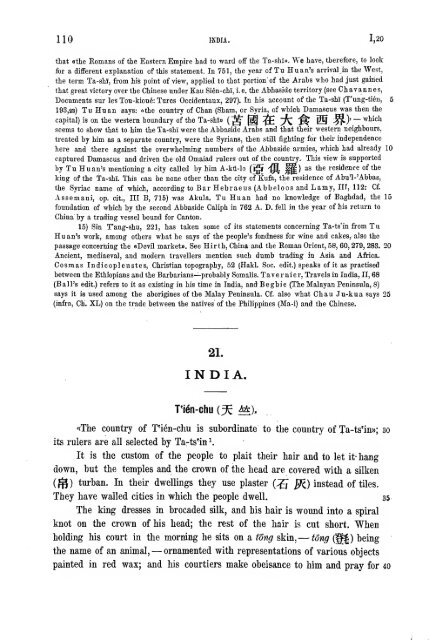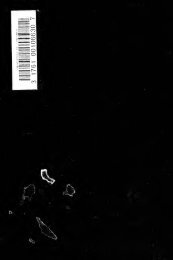Chau Ju-Kua - University of Oregon Libraries
Chau Ju-Kua - University of Oregon Libraries
Chau Ju-Kua - University of Oregon Libraries
You also want an ePaper? Increase the reach of your titles
YUMPU automatically turns print PDFs into web optimized ePapers that Google loves.
110 INDIA. 1,20<br />
that (ithe Romans <strong>of</strong> the Eastern Empire had to ward <strong>of</strong>f the Ta-shi». We have, therefore, to look<br />
for a different explanation <strong>of</strong> this statement. In 751, the year <strong>of</strong> Tu Huan's arrivalJn the West,<br />
the term Ta-shJ, from his point <strong>of</strong> view, applied to that portion <strong>of</strong> the Arabs who had just gained<br />
that great victory over the Chinese under Kau Sien-chi, i. e. the Abbaside territory (see Chavannes,<br />
Documents sur les Tou-kiou§: Turcs Occidentaux, 297). In his account <strong>of</strong> the Ta-shi (T'ung-tien, 5<br />
193,23) Tu Huan says: othe country <strong>of</strong> Chan (Sham, or Syria, <strong>of</strong> which Damascus was then the<br />
capital) is on the western boundary <strong>of</strong> the Ta-shlf» {'^ ^ ^ ^ ^ ffi ;^)j — which<br />
seems to show that to him the Ta-shi were the Abbaside Arabs and that their western neighbours,<br />
treated by him as a separate country, were the Syrians, then still iighting for their independence<br />
here and there against the overwhelming numbers <strong>of</strong> the Abbaside armies, which had already 10<br />
captured Damascus and driven the old Omaiad rulers out <strong>of</strong> the country. This view is supported<br />
by Tu Huan's mentioning a city called by him A-ku-lo (^ -^ ^) as the residence <strong>of</strong> the<br />
king <strong>of</strong> the Ta-shl. This can be none other than the city <strong>of</strong> Kufa, the residence <strong>of</strong> Abu'l-'Abbas,<br />
the Syriac name <strong>of</strong> which, according to Bar Hebraeus (Abbeloos and Lamy, III, 112: Of.<br />
Assemani, op. cit.. Ill B, 715) was Akula. Tu Huan had no knowledge <strong>of</strong> Baghdad, the 15<br />
foundation <strong>of</strong> which by the second Abbaside Caliph in 762 A. D. fell in the year <strong>of</strong> his return to<br />
China by a trading vessel bound for Canton.<br />
15) Sin T'ang-shu, 221, has taken some <strong>of</strong> its statements concerning Ta-ts'in from T u<br />
Huan's work, among others what he says <strong>of</strong> the people's fondness for wine and cakes, also the<br />
passage conceriiing the «Devil marketn. See Hirth, China and the Roman Orient, 58, 60, 279, 283. 20<br />
Ancient, mediaeval, and modern travellers mention such dumb trading in Asia and Africa.<br />
Cosmas Indicopleustes, Christian topography, 52 (Hakl. Soc. edit.) speaks <strong>of</strong> it as practised<br />
between the Ethiopians and the Barbarians-^probably Somalis. Ta vernier, Travels in India, II, 68<br />
(Ball's edit.) refers to it as existing in his time in India, and Begbie (The Malayan Peninsula, 8)<br />
says it is used among the aborigines <strong>of</strong> the Malay Peninsula. Cf also what <strong>Chau</strong> <strong>Ju</strong>-kua says 25<br />
(infra, Ch. XL) on the trade between the natives <strong>of</strong> the Philippines (Ma-i) and the Chinese.<br />
21.<br />
INDIA.<br />
T'ien-chu (^ ^).<br />
'(The country <strong>of</strong> T'ien-chu is subordinate to the country <strong>of</strong> Ta-ts'in»; so<br />
its rulers are all selected by Ta-ts'in^.<br />
It is the custom <strong>of</strong> the people to plait their hair and to let it- hang<br />
down, but the temples and the crown <strong>of</strong> the head are covered with a silken<br />
(^) turban. In their dwellings they use plaster (;g' ^) instead <strong>of</strong> tiles.<br />
They have walled cities in which the people dwell. 35<br />
The king dresses in brocaded silk, and his hair is wound into a spiral<br />
knot on the crown <strong>of</strong> his head; the rest <strong>of</strong> the hair is cut short. "When<br />
holding his court in the morning he sits on a tSng skin,— tong (^) being<br />
the name <strong>of</strong> an animal, — ornamented with representations <strong>of</strong> various objects<br />
painted in red wax; and his courtiers make obeisance to him and pray for 40

















